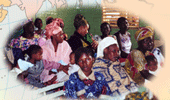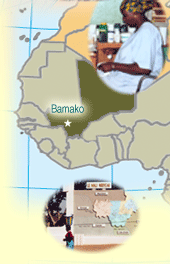
Advocacy to Abandon Female Genital Cutting
In Mali, where 92% of women have experienced female genital cutting (FGC), political will is against the harmful traditional practice. USAID/Mali asked PRIME II to assist the Ministry of Health in developing and piloting a national training curriculum for primary providers to increase their capacity to identify, treat or refer FGC complications and educate and counsel clients and community members on the negative aspects of the practice. Job aids and a 35-minute video on complications of excision were also produced as part of a FGC resource package, and the video was popularized and supported by government officials and members of parliament. To increase the impact of the intervention, PRIME collaborated with local stakeholders to build a network including trained providers, NGO extension workers and community and religious leaders to plan a community-based FGC abandonment strategy and identify appropriate messages. The community component was implemented in 97 villages of Bougouni district.
Key Results: At 27 health centers in the three PRIME intervention zones, the percentage of providers with an acceptable level of FGC knowledge increased from 0% at baseline to 55% at final evaluation (n=127). Nearly three quarters of providers passed the counseling skills performance test, up from 12% at baseline, and the improved counseling also paid off in a dramatic increase in educational sessions on reproductive health topics in general. At the end of the year-long intervention, surveys showed that the percentage of clients who said they were in favor of eliminating FGC rose from 24% to 60% in the intervention zone, while holding steady at 31% in a control zone (n=364). The percentage of clients who said they intended to excise their daughters declined from 68% to 42% in the intervention zone while increasing from 64% to 74% in the control zone (n=367). A separate evaluation of the five-month community project showed equally encouraging results. The percentage of men and women who said they were in favor of abandoning FGC increased from 15% at baseline (n=100) to 62% (n=528), and the percentage who intended to have FGC performed on their daughters declined from 81% to 33%.
Preventing Postpartum Hemorrhage
PRIME II trained skilled birth attendants in active management of the third stage of labor (AMTSL) for vaginal deliveries at eight pilot sites in Mali as part of USAID’s special initiative to prevent postpartum hemorrhage in four African countries (Mali, Benin, Ethiopia, Zambia). PRIME also helped to begin work at the national level to incorporate AMTSL into service standards and protocols, start the process of revising pre-service training curricula to include AMTSL, and emphasize the importance of endorsing skilled attendants to administer oxytocics.
Key Results: Provider scores for overall performance of AMTSL (record-keeping, infection prevention, administration of oxytocin, controlled cord traction and uterine massage) increased from 29% at baseline to 94% at final evaluation. Vaginal births with AMTSL at the intervention sites increased considerably: from 0% to 55% (6,151/11,191 births). No complications were reported at any of the sites. The Ministry of Health has indicated their interest in country-wide scale-up of AMTSL, and USAID/Mali has included prevention of postpartum hemorrhage as a high-impact service in its two bilateral projects.
Supporting In-Service Training
Beginning in 1998, PRIME I and PRIME II worked to improve the quality and accessibility of family planning and maternal and child health services in Mali by helping to revise service guidelines, develop and validate a national in-service training strategy, and strengthen linkages between pre-service education and in-service training programs. PRIME II assisted the Ministry of Health in establishing a national training unit, disseminating the in-service training strategy, adapting and implementing it in six of the country’s nine regions, and creating a set of national training standards and tools. In response to a request from the MOH for trials of innovative training methods, PRIME also helped the MOH implement a distance-based learning pilot to improve the prenatal care performance of 40 matrons in Sikasso district.
Key Results: Regional and in-service training management units are in place, annual plans have been prepared in each of the six regions, and 60 national and regional trainers are prepared to implement quality RH training programs. Instructors and teachers from nursing schools were prepared for ongoing integration of prevention of postpartum hemorrhage and awareness of FGC in the pre-service curricula. The training strategy is being expanded to the northern regions of the country. Matrons participating in distance-based learning (n=40) improved their overall performance scores in prenatal care from 15% at baseline to 76% at three months follow-up.
|











